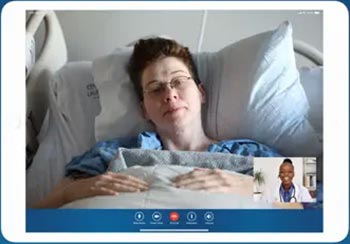Communication is the #1 diagnostic tool for clinicians and the #1 empowerment tool for patients. At Door County Medical Center (DCMC), we've embraced MARTTI (My Accessible Real-Time Trusted Interpreter) to ensure that language barriers do not impede the quality of care our patients receive.
What is MARTTI, and how does it work?
MARTTI is an advanced translation service that connects patients to certified medical interpreters through an iPad's two-way audio and video connection. This HIPAA-approved system provides 24/7, on-demand interpreting in over 250 languages, including sign language. By eliminating communication barriers, MARTTI allows clear and accurate exchanges between patients and healthcare providers.
 When patients visit the Emergency Department, Urgent Care, or DirectCare, the first point of contact is responsible for initiating the interpreter call using the MARTTI iPad. This device travels with the patient into the exam room, ensuring continuous communication throughout their visit. For clinic appointments, schedulers use over-the-phone interpreters during the scheduling process. Upon the patient's arrival, the MARTTI device is brought to them, and the appropriate language is selected on the iPad, facilitating all communication between the clinician and the patient through the interpreter.
When patients visit the Emergency Department, Urgent Care, or DirectCare, the first point of contact is responsible for initiating the interpreter call using the MARTTI iPad. This device travels with the patient into the exam room, ensuring continuous communication throughout their visit. For clinic appointments, schedulers use over-the-phone interpreters during the scheduling process. Upon the patient's arrival, the MARTTI device is brought to them, and the appropriate language is selected on the iPad, facilitating all communication between the clinician and the patient through the interpreter.
Recalibrating Services to Meet Patient Needs
 Kelly Jorgenson, Director of Primary Care Clinic Services in Sturgeon Bay, explains the need for MARTTI: "Our previous language-line service was not as well-staffed and lacked 24/7 on-demand availability. This made it challenging to provide prompt support for less common languages." She also points out the difficulties with sign language interpretation: "We had to schedule interpreters from the Fox Valley, which was both time-consuming and inconvenient for patients who needed immediate care."
Kelly Jorgenson, Director of Primary Care Clinic Services in Sturgeon Bay, explains the need for MARTTI: "Our previous language-line service was not as well-staffed and lacked 24/7 on-demand availability. This made it challenging to provide prompt support for less common languages." She also points out the difficulties with sign language interpretation: "We had to schedule interpreters from the Fox Valley, which was both time-consuming and inconvenient for patients who needed immediate care."
To address these challenges, DCMC transitioned to MARTTI, driven by the need for a more efficient and comprehensive language support system that complies with federal regulations for language access services.
Further, the interpreter services are integral to creating various healthcare documents. This includes translating patient education materials, consent forms, and other essential documents into multiple languages.
"We also rely on interpreter services to translate healthcare information from non-English-speaking healthcare organizations into English. This is particularly important when we receive medical records or other pertinent information from international healthcare providers. Accurate translation ensures that our medical staff can fully understand a patient's medical history and provide appropriate care."
The Impact of MARTTI on Patient Care
The implementation of MARTTI has significantly improved patient care at DCMC. Jorgenson highlights a particularly impactful example: "I was called to the clinic waiting area to assist a non-English-speaking person who had just walked in. As I approached, I could see the look of concern on their face, and it was clear they needed help but couldn't communicate in English. I wasn't familiar with the language they were speaking, so I quickly grabbed the MARTTI iPad."
She recounts, "The patient pointed to their country of origin on the map, and I selected the corresponding interpreter on the MARTTI device. Within moments, we were connected with a live video interpreter who spoke the patient's language fluently. The patient's relief was immediate; they could accurately explain their symptoms and medical history through the interpreter. This allowed us to complete their registration and ensure the necessary care without further delays."
Throughout the process, the patient repeatedly expressed gratitude, shaking Jorgenson's hand and thanking her for helping them navigate what must have been a very stressful situation. This is a powerful reminder of the importance of effective communication in healthcare and how technology can bridge language barriers to provide compassionate care.
•
 Jorgenson notes, "In the ten years I've worked at DCMC, we've seen a significant rise in the need for interpreter services. This reflects the growing diversity of our patient population, which includes residents and visitors from around the world."
Jorgenson notes, "In the ten years I've worked at DCMC, we've seen a significant rise in the need for interpreter services. This reflects the growing diversity of our patient population, which includes residents and visitors from around the world."
She continues, "Implementing on-demand interpreter services has effectively removed language barriers, ensuring that all patients, regardless of their native language, receive safe and effective care. This service has greatly enhanced our ability to communicate clearly with patients, understand their concerns, and provide the appropriate medical attention."
Jorgenson concludes, "The positive feedback from patients and their families has been overwhelming. MARTTI has improved patient satisfaction and underscored our commitment to providing equitable and accessible healthcare."